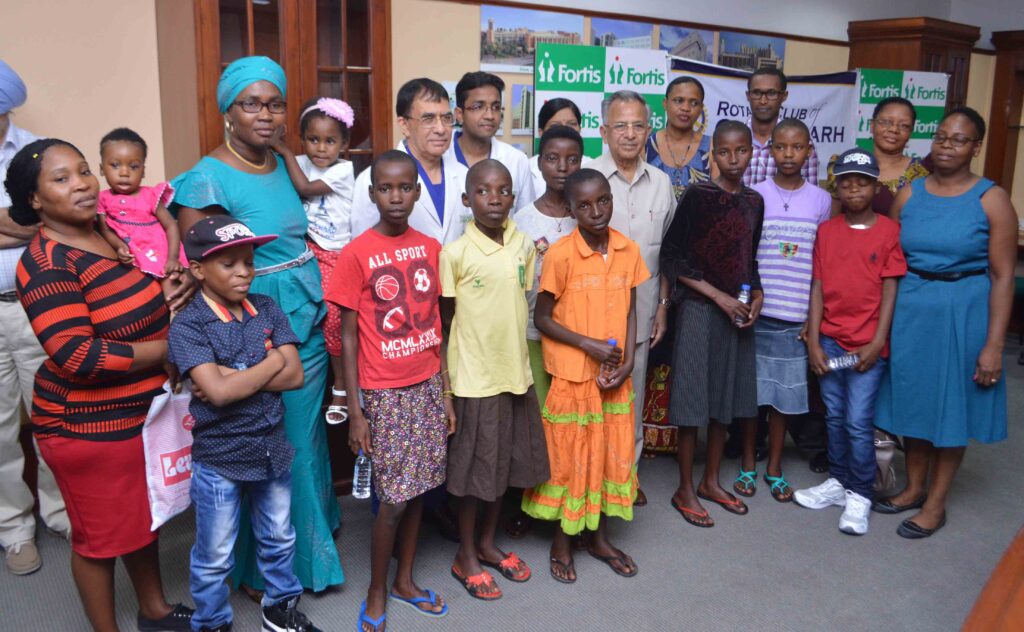
After a heart surgery, Farirai has returned home to Zimbabwe with a mended heart. The four-year-old was suffering from a congenital heart disorder (CHD) that demanded immediate surgery. Rtn C J Singh explains how PRIP Rajendra K Saboo, who has been leading medical missions to Africa, was approached by different governments to help save lives of these children requiring heart surgery. Ten children from Zimbabwe and 20 from Rwanda were promised heart surgery and Farirai was one of them.
Between selection and surgery, these malnourished children have to survive three weeks. “African doctors use nutritional therapy during this period to help their treatment and recovery,” says Singh. The African Rotary Clubs fund the air fare of the child and the mother (only in few cases the fathers come) to India and RC Chandigarh hosts them in India.
Heartline’s chronicle
In 1996, RC Chandigarh was approached by a local poor family to save their child who was suffering from a congenital cardiac disorder. “By the time the funds were allocated we had lost the child,” says Singh. Saboo who was saddened by this incident announced at a club meeting that “no child suffering from any congenital cardiac disease will die for want of money,” and presented the idea of a novel project to provide corrective heart surgery for children and adults upto 20.
This $100,000 project named ‘Gift of Life’ was initially planned for two years to cover the cost of 50 operations. The Rotary Foundation provided a Matching Grant of $50,000. The remaining funds were contributed by the club, District 3080’s Designated Funds, RI District 2630, Japan, and RC Ebingen, D 1830, Germany. The club partnered with the Post Graduate Institute of Medical Education and Research (PGIMER) which offered free operation and hospitalisation. With donations pouring in, 100 children were operated that year.
In 2005, a new born who was rushed to PGIMER was turned away as the hospital wasn’t equipped to operate on infants. Fortis Hospital at Mohali was approached and the child was saved. Rotary then entered into an agreement with the Fortis Hospital and the project was renamed Heartline “and we are still going strong,” says Singh. He recalls the touching gesture of 9-year-old Khalina from Pakistan, “dressed in vibrant colours with matching bangles, who stood up on a chair and said ‘Mujhe khuda ne janam Pakistan mein diya, zindagi Hindustan ne di. Hindustan Zindabad. Pakistan Zindabad (I was born in Pakistan, but India has given me life.)’”
Indian Patients
According to an Indian research study, nearly 1,80,000 children are born with heart defects each year and approximately 10 per cent of child mortality is caused by congenital heart disease. Many children from rural India “simply return to their homes and count the days of their dying child as they cannot afford the surgical cost,” says Singh.Till now, RC Chandigarh has saved the lives of 440 children from India.
Club members have organised the stay and made arrangements for the treatment of six more girls from Rwanda. Dr Ashish Bhatia, COO (North and East), Fortis Healthcare Ltd, says, “It’s a project that is very dear to our hearts as it reflects our commitment to quality, compassionate patient care and is a support system for the underprivileged. A special thanks to Saboo, who started this project; his efforts to support the cause are tremendous.”
“If Sabooji is in town he makes it a point to receive the children and welcome them with a warm smile,” says Singh. He says the team of heart surgeons led by Dr TS Mahant, Executive Director, Cardiothoracic and Vascular Surgery at Fortis, Mohali, “work with interpreters to negate the language barriers. For them their best reward is the satisfaction that they get in the form of priceless smiles and joy on the faces of the parents.”
For RC Chandigarh, this is a continuing project and “we consider every child who needs cardiac surgery as our own, and do everything we can to save them,” adds Singh.






